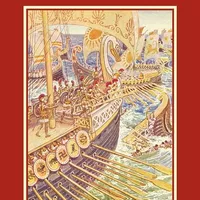35. How Horatius Kept the Bridge
"With weeping and with laughter Still is the story told, How well Horatius kept the bridge In the brave days of old." —MACAULAY.
Still in the shadow-land of history, a family called Tarquin came to live in Rome. Their father, a wealthy merchant, had come from Greece, bringing with him some of the artists and sculptors, whose genius had made his Greek home so beautiful. Tarquin married an Italian lady and made great friends with the king, at whose death he became King of Rome himself.
So a Greek ruled over Rome. This Tarquin was the first Roman king to wear a purple robe and crown of gold, and he planned a sort of little Olympia, in the plain below the city, where games could be played and chariot-races run. For over a hundred years, the Tarquins ruled over Rome, and they did a great deal for the city, by introducing what they had learnt in Greece. But after a time the Romans rose against them. They dethroned the last of the Tarquins and elected two consuls instead.
Tarquin fled to a great and powerful king called Lars Porsena, who collected an army and marched with him to Rome to help him regain his lost kingdom. But the Romans had a brave citizen called Horatius, and the legend says he defended the bridge over the Tiber and so saved Rome.
This is the story: While Lars Porsena and his huge army were on the march to Rome, laying waste the country, through which they passed, the consul of Rome and the Fathers of the City were holding a hurried council before the River Gate. "The bridge must be destroyed," said the consul. "Nothing else can save the town." "Just then a scout came flying, All wild with haste and fear: 'To arms! to arms! Sir Consul: Lars Porsena is here.' On the low hills to the westward, the great army could be seen. Louder and louder sounded the trumpet's war-notes, while in broken gleams shone the long array of bright helmets and glittering spears. Under the royal standard Lars Porsena himself sat in his ivory car. The Roman consul grew very grave.
" 'Their van will be upon us Before the bridge goes down; And if they once may win the bridge, What hope to save the town?' Then out spake brave Horatius, The Captain of the Gate: 'To every man upon this earth Death cometh soon or late. And how can man die better Than facing fearful odds, For the ashes of his fathers, And the temples of his Gods. 'Hew down the bridge, Sir Consul, With all the speed ye may; I, with two more to help me, Will hold the foe in play. In yon strait path a thousand May well be stopped by three. Now who will stand on either hand, And keep the bridge with me!' Two Romans stepped forth at once and offered to help, and the dauntless three went forth against the mighty army of Lars Porsena.
"Now while the Three were tightening Their harness on their backs, The Consul was the foremost man To take in hand an axe: And Fathers, mixed with Commons, Seized hatchet, bar, and crow, And smote upon the planks above, And loosed the props below." On came the great host, laughing at the thought of three men keeping the bridge against them. Three chiefs with swords and shields came forward to fight, but in a few minutes they all three lay dead at the feet of Horatius and his two friends. Forward came another three, but only to meet with the same fate. The laughter died away, and for a time, none dared venture forth against these brave Romans.
"But meanwhile axe and lever Have manfully been plied; And now the bridge hangs tottering Above the boiling tide. 'Come back, come back, Horatius!' Loud cried the Fathers all. 'Back, Lartius! back, Herminius! Back, ere the ruin fall!' Back darted Spurius Lartius; Herminius darted back: And, as they passed, beneath their feet They felt the timbers crack. But when they turned their faces, And on the farther shore Saw brave Horatius stand alone, They would have crossed once more. But with a crash like thunder Fell every loosened beam, And, like a dam, the mighty wreck Lay right athwart the stream. And a long shout of triumph Rose from the walls of Rome, As to the highest turret-tops Was splashed the yellow foam." Alone stood Horatius—thrice 30,000 foes before and the broad flood behind. His foes besought him to yield, but he took no notice. He looked beyond the rushing river, to the white porch of his home, on the Palatine Hill, and then he cried to the river that rolls by the towers of Rome—
" 'Oh, Tiber! father Tiber! To whom the Romans pray, A Roman's life, a Roman's arms, Take thou in charge this day.' With these words he plunged headlong into the fiercely flowing river. Not a sound of joy or sorrow rose from either bank. All watched in breathless silence the brave man's struggles. Suddenly they saw his helmet appear above the foaming waters, and a shout of delight arose from the Romans—
" 'Heaven help him!' quoth Lars Porsena, 'And bring him safe to shore; For such a gallant feat of arms Was never seen before.' Horatius reached home in safety, and amid weeping and clapping he was borne through the gate of Rome by the joyous crowds. They erected a golden statue of their hero and wrote his deed in letters of gold.

